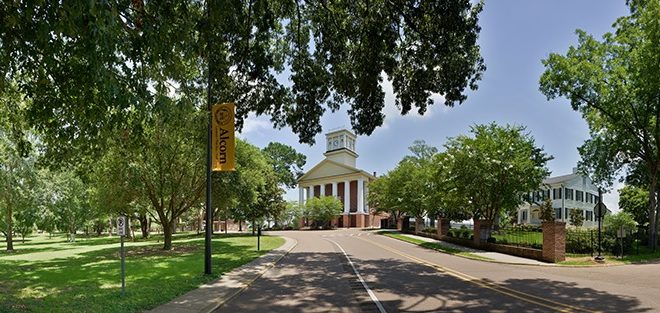ALCORN STATE ROBBED!

Alcorn State University robbed!

More than $257.8M of Alcorn’s agricultural funds went to Mississippi State
According to a September 18th letter from U.S. Secretary of Education Miguel Cardona and U.S. Secretary of Agriculture Thomas Vilsack, over the last thirty years the state of Mississippi has short-changed Alcorn State University by some $257,807,216 in agricultural funds from the federal government.
Based upon the second Morrill Act of 1890, it states that in order to establish a second land-grant college for the purpose of creating racially separate colleges, it is required to distribute federal land-grant funds equitably between the institutions. This, Mississippi has not done. The same holds true for fourteen other states which were found guilty of similar robberies. Only Ohio and Delaware, of the states with such racially-created land-grant colleges, were said to have clean hands. America’s historically Black land-grant colleges as a group have been robbed of $12.6 billion over the last thirty years.
Instead of state leaders in Mississippi equitably distributing its federal land-grant allocations between Alcorn (ASU) and Mississippi State University (MSU), Mississippi State has long gotten the lion’s share of the funds. Going back as far as the 1973 figures compiled for the Ayers litigation up to and including the 2024 allocations, this writer has studied the robbery. In the latest allocation (2024), ASU received 7.8% of the agricultural funds while MSU received 92.2%. If the figures are adjusted such that the veterinarian medical school funds are counted separately, ASU would still be found to have received only 10% of the funds.
An irony in this situation is that MSU was not established until 1878, seven years after ASU. It came into being after the University of Mississippi decided that it no longer desired to operate agricultural and industrial programs. Meanwhile, Alcorn was busily engaged in agricultural research and training for Black citizens.
Based upon the funding discrepancies over the years, MSU now has programs and experimental stations in every county across the state. ASU only has a handful of specialized programs in the entire state. Observing the history of racial discrimination in much of the agricultural industry, it is easy to see how Black farmers and Black communities have been under-developed and under-supported. Secretaries Cardona and Vilsack indeed point to that fact and indicate that Black farmers’ economic conditions are behind those of white farmers and that ASU is not on par with MSU “due largely to unbalanced funding.”
Although the two U.S. officials cover only the last 30 years of funding disparities, the disparate condition has a lifespan of more than one hundred years. When the Ayers lawsuit was originally filed in 1975, one of its complaints was that agricultural programs at ASU were not funded on a basis equitable with those at MSU. Some plaintiffs at that time argued for an adjustment in the agricultural programs across the state, such that one-half would be under the jurisdiction of ASU and one-half under the jurisdiction of MSU, with funding being similarly divided. Those arguments were never seriously considered by state officials and the complaint itself was lost in the decades-long court ordeal. Once a settlement agreement was signed, the matter surfaced no more. Its resurrection this summer by the federal government could mean that this unresolved matter could be taken up by the courts with a different outcome this time around.
Cardona and Vilsack expressed a willingness to work together with Mississippi Governor Tate Reeves and the other 14 governors and their state budget offices in order to rectify the condition. Along with that offer, they made two cautionary suggestions. One is that funding for the already well-endowed institution (MSU) does not have to be lost in order to accommodate the other (ASU), but that adjustments must be made over a period of time, bringing them together and compensating ASU. The second is that state allocations should not be reduced for the underfunded institution (ASU) as the federal gap is closed. In making those two suggestions, it is as if the federal officials were reading the history and/or the minds of the state officials. Mississippi officials, including the college board, had recoiled against more funding for Alcorn years ago on the grounds that it would mean less money for Mississippi State. Similarly, general funding for the state’s HBCUs had been reduced as the Ayers funds were dispensed to Alcorn, Jackson State, and MVSU. These federal officials were suggesting that history not be repeated in either score.
Word is slowly getting around that ASU, like the HBCUs in 15 other states, has been robbed of millions of dollars on agricultural funds. The question is, “what happens next?”
Thus far, it is a bad sign that virtually nothing has been heard from Governor Reeves nor from Mississippi’s legislative leaders in response to the letter from Cardona and Vilsack. While this is not surprising, it is bad because it may signify that they plan to do nothing, making court action necessary. It is a further bad omen that there has not been a flood of comments from Alcorn alumni and other Black leaders. Alcorn alumnus Duvalier Malone eloquently expressed himself in the Clarion Ledger, but not much else has been aired. One would have thought that there would be scores of comments condemning the state’s robbery and supporting the efforts to recoup Alcorn’s funding.
One is not surprised that nothing has been heard from the Alcorn administration on the matter. It is fairly typical for administrators appointed by the college board to remain silent of “political” matters, even if and when the matters touch on the viability and survival of the institutions which they lead. There have been questions raised as to whether the appointment and retention of Dr. Tracy Cook as Interim President of Alcorn State University is related to the matter of keeping the lid on until this matter of funding for Alcorn’s agricultural programs blows over. Many feel that as interim, Cook has less authority or freedom to speak up than would otherwise be the case.
Aside from that concern, it is still a reality that Alcorn has been robbed and continues to be robbed under the current arrangement. Perhaps since the issue has now been raised again, and this time nationally, something has to give.
414 S. State Street, Suite 101
Jackson, MS 39201
Copyright 2023 By the Jackson Advocate Newspaper Inc. All Rights Reserved.
No duplication of the materials contained herein is permitted without the express written permission from the publisher.









